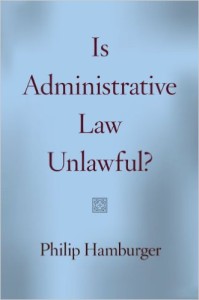… is from page 57 of Columbia University law professor Philip Hamburger’s superb 2014 book, Is Administrative Law Unlawful? (footnote deleted):

Star Chamber regulations thus offered yet another avenue for extralegal legislation, and they therefore became one of the reasons for the court’s demise. Of course, some of these regulations were valuable. Coming, however, from an unrepresentative body that exercised power outside the law, they seemed both heavy handed and incompatible with liberty. As Parliament explained when it abolished the Star Chamber in 1641, the “decrees of that court” had been “found to be an intolerable burden to the subjects and the means to introduce an arbitrary power and government.”
Although Star Chamber’s issuance of regulations came to an end with the court itself, administrative regulations have come back to life. Not merely one administrative body, but dozens now issue regulations that constrain the public. Some agencies are directly authorized by legislation; others merely have legislative acquiescence. Either way, they bind the public outside rather than through the law, and they thereby revert to the extralegal lawmaking that was rejected in the seventeenth century.
…..
DJBx: One of the grave errors of the modern mind – an error found in America in the presumptions, assertions, and actions of “Progressives” from Woodrow Wilson through Barack Obama – is the belief that society must, or should, be engineered. This principal belief naturally entails the subsidiary beliefs that the engineering must be done by the state, and that in doing its engineering the state must ignore, or even destroy, any forces of social organization that hamper state-officials’ social-engineering efforts.
A great deal of legislation and, especially, law in a free society is inevitably inconsistent with the blueprints of social engineers. And so, in their unreflective and unscientific presumption that society has no self-organizing forces, the social engineers are blind to the logic of the law and to the importance of legal processes. The social engineers therefore do not see – because their blindness prevents them from seeing – the benefits that emerge over time through the operations of decentralized, spontaneous-ordering forces. The social engineers’ designs and intrusions destroy, or at least severely weaken, these forces. But being blind to these forces, the social engineers are blind to what they destroy.
The social engineers do not have true science on their side. They are, at best, manipulators of only that which can be seen – of only that which is present today. Thinking society to be an inert mass that has no motive force other than what a designing engineer gives to it, social engineers – that is, those with what is erroneously called a “Progressive” mindset – substitute their own puny and information-scant motive forces for the far more subtle and information-rich motive forces of the spontaneous order. The former, however, being backed by guns and cages, too often triumphs over the latter. Society regresses.



